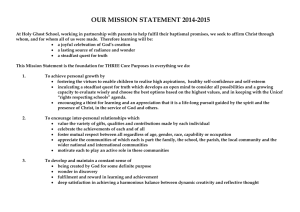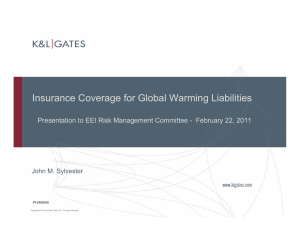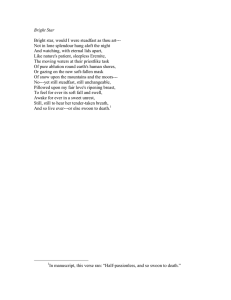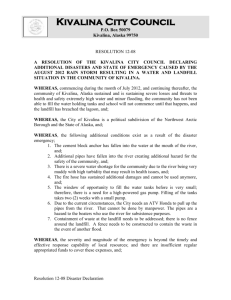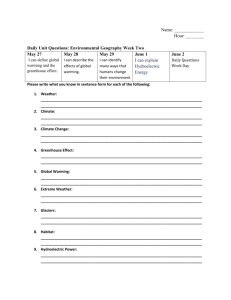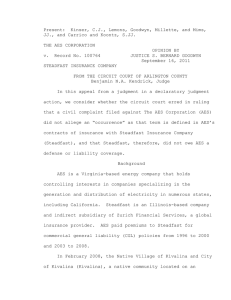Virginia Supreme Court Rules That Insurer Related Claims
advertisement
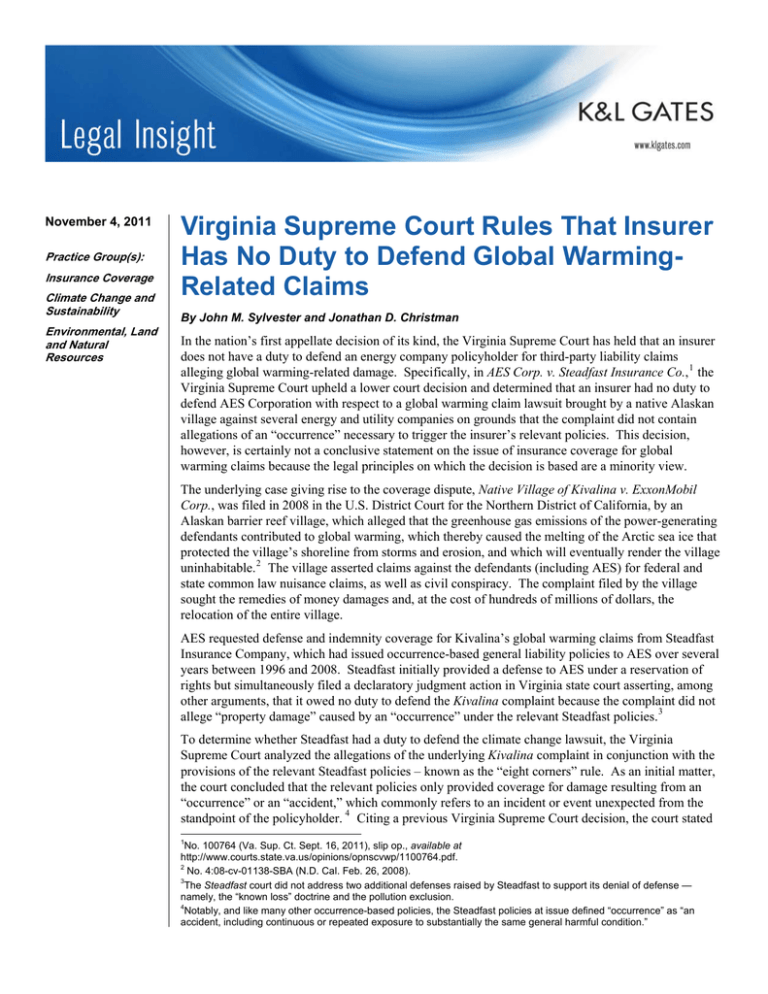
November 4, 2011 Practice Group(s): Insurance Coverage Climate Change and Sustainability Environmental, Land and Natural Resources Virginia Supreme Court Rules That Insurer Has No Duty to Defend Global WarmingRelated Claims By John M. Sylvester and Jonathan D. Christman In the nation’s first appellate decision of its kind, the Virginia Supreme Court has held that an insurer does not have a duty to defend an energy company policyholder for third-party liability claims alleging global warming-related damage. Specifically, in AES Corp. v. Steadfast Insurance Co., 1 the Virginia Supreme Court upheld a lower court decision and determined that an insurer had no duty to defend AES Corporation with respect to a global warming claim lawsuit brought by a native Alaskan village against several energy and utility companies on grounds that the complaint did not contain allegations of an “occurrence” necessary to trigger the insurer’s relevant policies. This decision, however, is certainly not a conclusive statement on the issue of insurance coverage for global warming claims because the legal principles on which the decision is based are a minority view. The underlying case giving rise to the coverage dispute, Native Village of Kivalina v. ExxonMobil Corp., was filed in 2008 in the U.S. District Court for the Northern District of California, by an Alaskan barrier reef village, which alleged that the greenhouse gas emissions of the power-generating defendants contributed to global warming, which thereby caused the melting of the Arctic sea ice that protected the village’s shoreline from storms and erosion, and which will eventually render the village uninhabitable. 2 The village asserted claims against the defendants (including AES) for federal and state common law nuisance claims, as well as civil conspiracy. The complaint filed by the village sought the remedies of money damages and, at the cost of hundreds of millions of dollars, the relocation of the entire village. AES requested defense and indemnity coverage for Kivalina’s global warming claims from Steadfast Insurance Company, which had issued occurrence-based general liability policies to AES over several years between 1996 and 2008. Steadfast initially provided a defense to AES under a reservation of rights but simultaneously filed a declaratory judgment action in Virginia state court asserting, among other arguments, that it owed no duty to defend the Kivalina complaint because the complaint did not allege “property damage” caused by an “occurrence” under the relevant Steadfast policies. 3 To determine whether Steadfast had a duty to defend the climate change lawsuit, the Virginia Supreme Court analyzed the allegations of the underlying Kivalina complaint in conjunction with the provisions of the relevant Steadfast policies – known as the “eight corners” rule. As an initial matter, the court concluded that the relevant policies only provided coverage for damage resulting from an “occurrence” or an “accident,” which commonly refers to an incident or event unexpected from the standpoint of the policyholder. 4 Citing a previous Virginia Supreme Court decision, the court stated 1 No. 100764 (Va. Sup. Ct. Sept. 16, 2011), slip op., available at http://www.courts.state.va.us/opinions/opnscvwp/1100764.pdf. 2 No. 4:08-cv-01138-SBA (N.D. Cal. Feb. 26, 2008). 3 The Steadfast court did not address two additional defenses raised by Steadfast to support its denial of defense — namely, the “known loss” doctrine and the pollution exclusion. 4 Notably, and like many other occurrence-based policies, the Steadfast policies at issue defined “occurrence” as “an accident, including continuous or repeated exposure to substantially the same general harmful condition.” Virginia Supreme Court Rules That Insurer Has No Duty to Defend Global Warming-Related Claims that “occurrence” or “accident,” as defined in standard insurance policies, did not cover intentional acts. 5 Additionally, the court concluded that the “natural and probable consequence” of a policyholder’s intentional act is also not an “accident.” In the coverage context, however, the court recognized that certain injuries caused by the intentional act(s) of a policyholder may be covered by an occurrence-based policy if the resulting harm or injury of the policyholder’s act(s) resulted from “unforeseen consequences that a reasonable person would not have expected to result.” 6 With respect to the underlying Kivalina complaint, the court concluded that the village of Kivalina alleged that AES, as a regular part of its power-generating activities, intentionally released and emitted greenhouse gases into the atmosphere. 7 Moreover, according to the court, Kivalina had alleged a “clear scientific consensus” that the “natural and probable consequence” of such intentional emissions is “global warming and damages such as Kivalina suffered.” 8 The court further reasoned that, because the results of these emissions were the natural and probable consequences of AES’s intentional actions, as alleged in the Kivalina complaint, a reasonable person would have anticipated such results. 9 As such, the court held, since AES knew or should have known the damage resulting from its intentional emissions of greenhouse gases, there was no “occurrence” within the meaning of the Steadfast policies. Thus, according to the court, even if AES was “actually ignorant” of the effects and consequences of its greenhouse gas emissions, any loss derived therefrom is not covered under the Steadfast policies because the alleged damage and injuries in the Kivalina complaint were the natural and probable consequences of AES’s intentional emissions. 10 In short, the court’s decision stands for the proposition that AES cannot be covered by Steadfast for global warming claims it should have anticipated. Although insurers will rely upon the Steadfast decision for the position that there is little or no coverage for global warming liabilities, there are significant bases upon which policyholders can resist that position. Indeed, this decision is only one ruling from one court in a jurisdiction that applied a minority-rule standard for determining whether a policyholder intended damage or injury so as to preclude coverage. The majority of jurisdictions in the United States, when determining whether an event constitutes a covered “occurrence” under a general liability policy, require both the policyholder’s act and the resulting harm to have been actually intended by the policyholder for the insurer to avoid coverage on grounds of no “accident” or “occurrence.” 11 Specifically, courts are split on whether the policyholder’s expectation or intent to cause damage is determined by a subjective standard (i.e., the harm is subjectively expected or intended by the insured in taking the relevant action) or an objective standard (i.e., a similarly situated reasonable person would have expected or intended the harm by taking the relevant action). The Steadfast decision applies the minority-rule “objective” standard adopted by Virginia courts. However, the majority view would apply a “subjective” standard and conclude that an occurrence definition was satisfied if the policyholder did not actually expect the resulting harm from his actions, regardless of whether a similarly situated reasonable person would have expected or intended such harm from taking the same action. Therefore, under the subjective standard, allegations regarding a particular energy company’s knowledge and intent about the consequences of greenhouse gas emissions and/or global warming 5 No. 100764, slip op. at 9. Id. at 10-11. 7 Id. at 12. 8 Id. 9 Id. at 12-13. 10 Id. at 14. 11 See James S. Malloy & John M. Sylvester, “Insurance Coverage for Global Warming Liability Claims,” Tort Trial & Insurance Practice Journal, Spring/Summer 2010 (45:3-4). 6 2 Virginia Supreme Court Rules That Insurer Has No Duty to Defend Global Warming-Related Claims would be considered in determining the intentionality of harm. The court in Steadfast, on the other hand, applying an objective standard of what a reasonable person should have known or expected, found AES’s actual intent to be irrelevant in determining coverage under the policy. In addition to applying the minority view on the standard for intentionality of harm, the Steadfast court completely rejected AES’s arguments that the Kivalina complaint provides a basis for liability in negligence, and thereby alleges an “occurrence.” Other courts interpreting this same complaint, however, may find that it does provide a basis for liability grounded in negligence. By way of example, the common-law nuisance counts are based on energy defendants’ acts that were “intentional or negligent.” 12 As described above, negligent acts – as well as intentional acts with unintended results – engaged in by the policyholder can be covered events. Accordingly, AES’s arguments in favor of coverage had substantial merit, and a different jurisdiction’s court reviewing the same allegations of the complaint may come to a different conclusion regarding coverage for defense of such allegations. Moreover, the Steadfast decision is limited to considering coverage for the specific claims and allegations as stated in the Kivalina complaint. Other global warming cases have previously been filed, such as the Comer and American Electric Power cases, 13 and at least the Comer case included a specific count based on negligence. 14 Additionally, although the Supreme Court of the United States has recently rejected global warming complaints based on federal common law in the American Electric Power case, 15 the possibility exists that similar lawsuits may be filed in the future alleging state common-law nuisance claims. 16 Given the foregoing, the Steadfast decision is not by any means the final or conclusive statement on insurance coverage for global warming liability claims asserted against industrial defendants. Insurers are no doubt pleased with the result of the Steadfast ruling, but it must be remembered that the ruling is only one court’s answer to a question that is not binding on courts in forty-nine other jurisdictions, many of which have adopted much different legal principles from which to answer the same question. If global warming claims continue to be asserted, courts in other jurisdictions with more policyholderfriendly insurance law will no doubt express their views on this issue. 12 Complaint for Damages ¶¶ 252, 265, Native Vill. of Kivalina v. ExxonMobil Corp., No. 4:08-cv-01138-SBA (N.D. Cal. Feb. 26, 2008) (emphasis added). 13 See, e.g., Comer v. Murphy Oil USA, No. 1:05-cv-00436-LTS-RHW (S.D. Miss. Aug. 30, 2007); Connecticut v. Am. Elec. Power Co., Nos. 05-5104-cv, 05-5119-cv (S.D.N.Y. 2005). The district courts in both cases found the plaintiffs had no standing to assert their global warming claims, but the Fifth and Second Circuit Courts of Appeals reversed and held that the plaintiffs had standing to pursue global warming claims against energy defendants for greenhouse gas emissions. See Comer v. Murphy Oil USA, 585 F.3d 855 (5th Cir. 2010), vacated on granting of motion for reargument en banc, 598 F.3d 208, appeal dismissed for lack of quorum, 607 F.3d 1049; Connecticut v. Am. Elec. Power Co., 582 F.3d 309 (2d Cir. 2009). 14 Third Amended Class Action Complaint ¶¶ 33-35, Comer v. Murphy Oil USA, No. 1:05-cv-00436-LTS-RHW (S.D. Miss. Apr. 19, 2006). 15 See John P. Krill, Jr., Climate Change Alert: Supreme Court Sides With Energy Industry, Finding That the Clean Air Act Displaces Any Federal Common Law of Public Nuisance in Global-Warming Litigation, LEGAL INSIGHT (June 21, 2011), available at http://www.klgates.com/supreme-court-sides-with-energy-industry-finding-that-the-clean-air-act-displaces-anyfederal-common-law-of-public-nuisance-in-global-warming-litigation-06-21-2011/. 16 American Electric Power et al. v. Connecticut et al., No. 10-174, slip op. at 15-16 (U.S. June 20, 2011), available at http://www.supremecourt.gov/opinions/10pdf/10-174.pdf. 3 Virginia Supreme Court Rules That Insurer Has No Duty to Defend Global Warming-Related Claims Authors: John M. Sylvester john.sylvester@klgates.com +1. 412.355.8617 Jonathan D. Christman jonathan.christman@klgates.com +1. 412.355.6262 4
